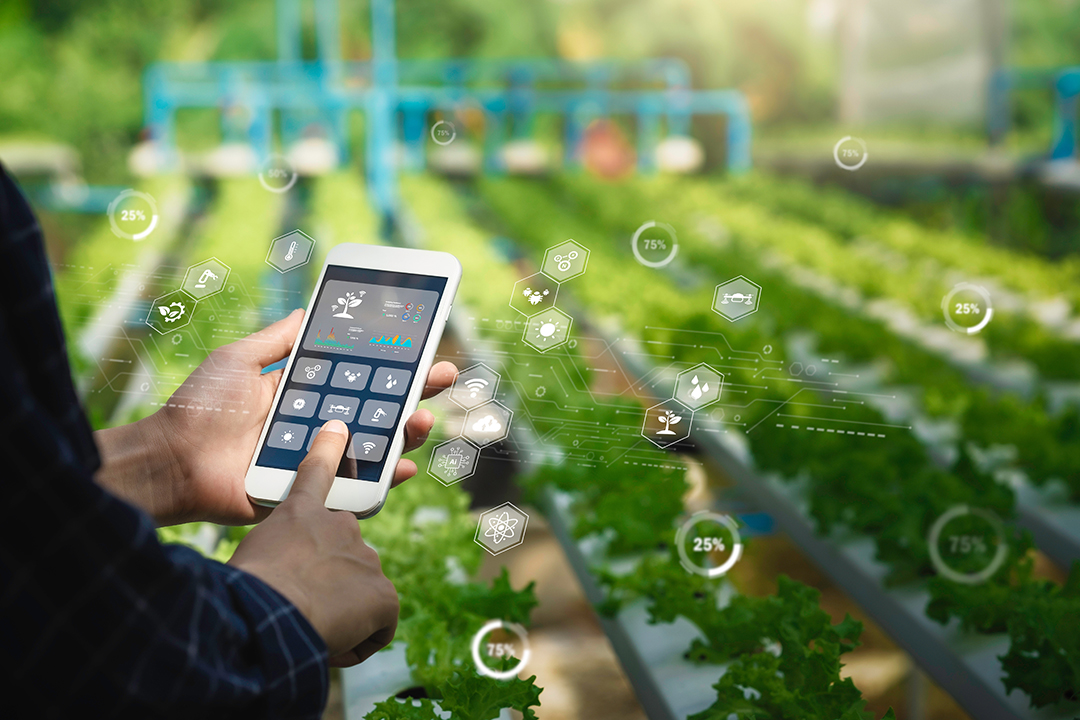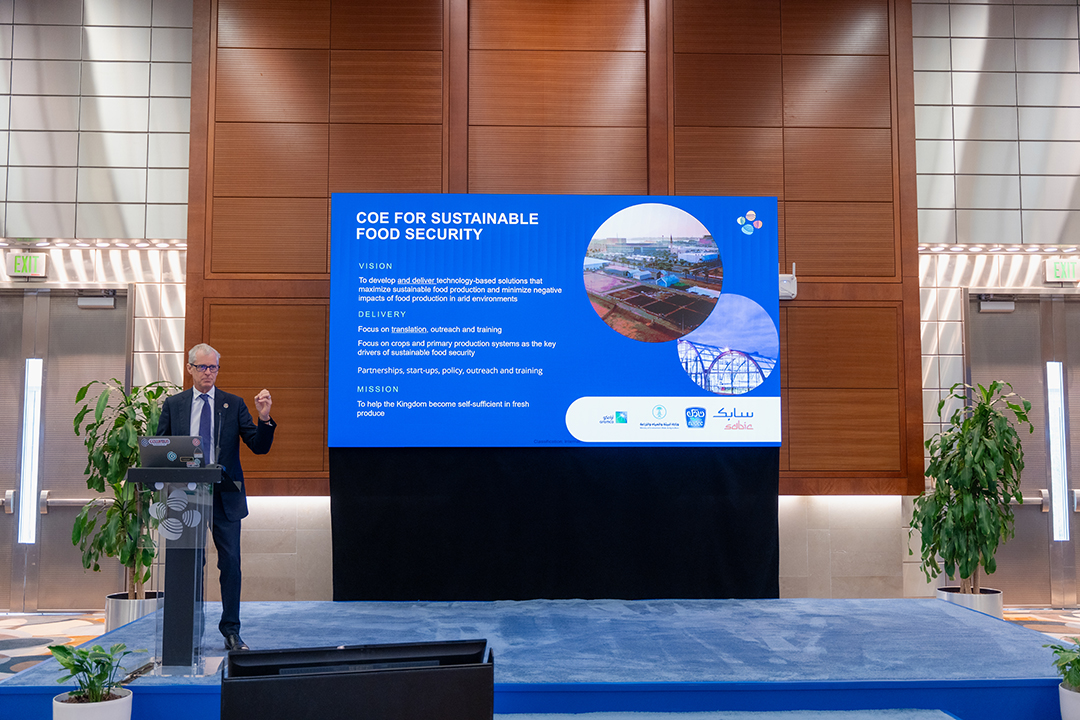Saudi Food Futures Forum: KAUST making desert agriculture sustainable

“Welcome to the future of food.” With that opening remark, KAUST President Sir Edward Byrne AC launched the inaugural Saudi Food Futures Forum, uniting scientists, industry partners, and policymakers to strengthen food security in one of the world’s driest regions.
King Abdullah University of Science and Technology (KAUST) hosted the November 2-3 forum to showcase the Center of Excellence (CoE) for Sustainable Food Security while providing a platform for collaboration and knowledge sharing to accelerate in-Kingdom farming innovation and position Saudi Arabia as a model for sustainable agriculture.
“This is a pivotal moment for Saudi Arabia — a pivotal moment under Saudi Vision 2030 — where food security stands alongside water, energy, and climate as a foundation of national resilience,” Sir Edward said, highlighting the Kingdom’s arid climate, limited freshwater resources, population growth, and strained global supply chains. These challenges underscore KAUST’s commitment to bold, science-based action.
“Our focus is clear: world-class science directed toward national needs, close partnerships with government and industry to accelerate impact, and the development of talent and ventures that strengthen the innovation ecosystem.”
Exemplifying the collaborative spirit of a mission-driven university, the two-day event at KAUST featured presentations with key national stakeholders, including H.E. Dr. Abdulaziz Al-Malik, deputy minister for research and innovation, Ministry of Environment, Water, and Agriculture (MEWA); H.E. Dr. Maha Aldhahi, chief executive officer, Saudi Reef Academy; and H.E. Eng. Rakan Al-Otaibi, secretariat director, Saudi Agri-Food Tech Alliance.
“We have to work together with all stakeholders involved; this forum is clearly an example of the energy that every member brings to this global effort,” said KAUST Professor Pierre Magistretti, vice president of research. He emphasized the vital role KAUST plays in food security.
“Because innovation is most powerful when it’s co-created, collaboration must begin not after the lab work is done but at the design stage — ensuring technologies are viable, scalable, and industry-ready.”
For example, partnerships with the National Center for Vegetation Cover (NCVC), industry, and academia ensure the 10-hectare Wadi Qudaid Experiment Station near Thuwal thrives as a living laboratory, said KAUST’s Dr. Rebekah Waller, the station’s director. The facility serves as a real-world technology deployment platform, where researchers and partners pilot sustainable farming and desert-restoration technologies for Saudi Arabia and desert regions globally.
Waller considers it a bridge for translating university research into practice, de-risking scalable solutions for self-reliance. She added: “We see the Wadi Qudaid Experiment Station as a hub for innovation, connecting agricultural, environmental, and industrial activities through R&D and field trials.”
Sowing seeds of food resilience

Professor Mark Tester, chair of the Center of Excellence for Sustainable Food Security, highlights KAUST agricultural innovations during the inaugural Saudi Food Futures Forum.
As it advances technology-based solutions for sustainable food production across Saudi Arabia, the CoE for Sustainable Food Security exemplifies KAUST’s strategic focus on research translation and national impact, said Professor Mark Tester, chair of the center. The forum showcased innovations such as using carbon dioxide from direct air capture for food production and integrating desalination and wastewater reuse systems in greenhouses.
“We need to make this transformation by building on and exploiting technology while recognizing that it must also make business sense. Nothing is truly sustainable unless it is both environmentally and economically viable,” Tester said, adding that his CoE focuses on crops and primary production systems — areas with large environmental footprints and where KAUST holds core expertise. “These are key drivers of sustainable food security.”
The rapidly growing global biostimulants market is one such opportunity that KAUST innovations in natural and synthetic compounds are tapping to grow better crops with less fertilizers, noted Professor Salim Al-Babili, Plant Science. He highlighted two solutions: a plant hormone that improves crop drought resilience and growth enhancers that boosts yields in peppers, potatoes, and wheat while reducing the need for synthetic fertilizers.
“My group focuses on plant metabolism — understanding metabolic pathways that influence growth, development, yield, resilience, and nutritional value — and translating this knowledge into practical agricultural solutions.”
Building better dates and wheat
Improving staple crops is central to KAUST’s mission of advancing sustainable agriculture in Saudi Arabia. Professor Jesse Poland, Plant Science, highlighted KAUST research to improve the genetics and productivity of date palms and wheat — two essential Saudi crops. His team is creating a genetic atlas to classify date palm varieties, boost pollen viability, and identify superior male trees to cut labor, water use, and costs.
“There is significant potential to improve date palms in Saudi Arabia through genetics and breeding, along with optimizing production practices including irrigation and fertilizer management,” Poland said. In parallel, KAUST aims to strengthen the Kingdom’s agricultural resilience and sustainability by introducing drought-tolerant, high-value wheat varieties.
Meanwhile, Professor Brande Wulff, Plant Science, explained how his team is cloning resistance genes to improve wheat crop resilience. Through the Saudi Wheat Landrace Initiative, he said, KAUST combines modern genomics with heritage preservation to secure the Kingdom’s wheat future, working with MEWA, Taibah University, and private growers to preserve, develop, and grow locally adapted, high-yielding varieties.
“We’re sequencing landraces to understand their origins, verify authenticity, and develop genomic certification to market them as premium, ‘boutique’ products that celebrate Saudi agricultural heritage.”
The autonomous future
Artificial intelligence and unmanned aerial vehicles (UAVs) can advance precision farming in greenhouse settings, said Professor Gianluca Setti, dean of the Computer, Electrical and Mathematical Sciences and Engineering (CEMSE) Division. He highlighted KAUST researchers who are creating realistic datasets to train AI models that monitor plant growth and health, using lightweight neural networks and multisensor UAVs for fast, automated, accurate analysis.
“Ultimately, we aim for a self-sufficient precision agriculture system capable of optimizing growth, water, and resource use in Saudi Arabia’s harsh environments,” he said.
KAUST’s goal: to launch Saudi Arabia into an era of self-sufficient fresh food production, reducing imports and optimizing water use. As Tester explained, locally sourced food enhances public health, creates employment opportunities, and supports the Kingdom’s net-zero goals by cutting air-freighted imports. The center’s emerging tools include plant science and genomics, robotics, advanced computing and sensors, nanotechnology, and biostimulants.
“We have a clear vision that through technology, science, delivery, and policy, we can generate a sustainable future where the Kingdom leads in producing high-value fresh food in one of the world’s toughest environments,” he added.

